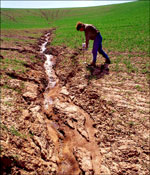Every day I try to protect my children from problems I didn’t create and cannot solve alone. I spread cream on their skin to shield them from the ultraviolet radiation that sneaks through our thinning ozone layer. I try to feed them food free of pesticides and hormones, but I know their bodies are exposed to a cocktail of toxic chemicals every day, despite my efforts. I give money and time to environmental initiatives and help care for a few hundred acres of land.

Tread lightly on the bike path of life.
I do what I can, but really keeping my children safe is going to require action at the level of whole watersheds, whole oceans, the whole atmosphere. It’s going to take bike paths, funding for sustainable agriculture projects, incentives for renewable energy, and limits on greenhouse emissions. And I can’t imagine much progress on any of those fronts without a democracy committed to the common good and the long-term future.
That’s why the Enron story leaves me feeling so outraged. My children’s future depends on our democracy functioning smoothly, but the Enron debacle reveals just how hobbled it currently is.
Our current system allows — even enables — a destructive cycle: Wealth gathers power to itself, and uses the power to gather more wealth. The voices of power and wealth grow stronger, while ordinary voices grow weaker by comparison. And, in general, the powerful voices do not speak for the long term or the common good. They can’t. The jobs of the CEOs, lobbyists, and consultants who are making all those campaign contributions depend upon maximizing shareholder value, quarter by quarter, month by month. So by definition, the people calling the shots cannot make the long term their first priority. Because of this, restoring our democracy must become as much a part of the environmental agenda as restoring wetlands or forests.
We could take a hint from Paul Krafel’s book, Seeing Nature, and start by thinking about erosion.

Like the accumulation of wealth and power, erosion is a cycle with momentum. A trickle of water carves a tiny channel in a grassless slope. The channel — now a low spot — attracts more water and becomes a deeper grove. Once erosion begins, water that could run uniformly across an entire hillside instead becomes channeled into one narrow, destructive gully. In the same way, in our current political system, money and power that could be spread across society become channeled in fewer and fewer hands.
The beauty of Krafel’s metaphor is that we know exactly what to do about erosion: Focus upstream where the gullies begin, and divert the flow of water so that gullies cannot form.
To fight erosion you plant grass. The grass takes root and holds the soil in place as each blade absorbs and diverts the flow of water in the gully. When you cast your vote in the next election, think of yourself as one of millions of blades of grass. You can diminish the power of the gully and increase the strength of a slower tributary by voting for someone who does not accept large campaign contributions. When you spend or invest your money, do what you can to make sure it ends up in a rivulet, not a gully: Buy from a local farmer, invest in a local business.

Fight the power of erosion.
Photo: USDA.
Your one vote and your meager shopping list may seem like tiny weapons against the kind of power revealed in the unfolding Enron saga. A single blade of grass looks fragile against a torrent of rain, too, but a whole patch of grass can absorb the force of a powerful storm.
To fight erosion you also build dams. You climb to the top of the hill, to the beginning of the gully, and you mold the soil into dams, breaking up the rush of water into smaller flows. You must build a dam that is strong enough to hold against the power of the water. In the fashion of dams, we need to discover how to come together as a solid unit standing close enough to each other to divert the erosive power right at its source. We might start by adding our strength to the dams already forming wherever anyone takes a stand for serious, stringent campaign finance reform.
Practically every Enron news article I’ve read has fueled a sense of outrage in me. But the particulars of Enron’s relationship to Congress and the president are only a distraction. As long as it rains, water will flow downhill. It can flow gently through the grass, nourishing everything, or it can race down whichever channel started first and grew the fastest. The outcome for the hillside is shaped not by the water, but by the grass and the dams.
So let us not waste time cursing the rain. Let’s find our seed and our hoes. Let’s use the outrage to speed our work.


